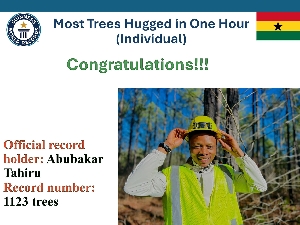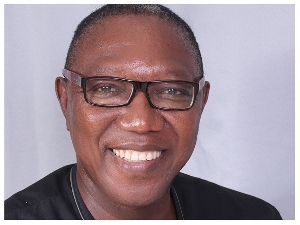By Dr. Michael J.K. Bokor
E-mail: mjbokor@yahoo.com
Sunday, August 28, 2011
I conclude my discussion of the fundamental problems that I consider to be an affront to Ghana’s democracy and why it is imperative that efforts be made to ensure that the democracy works in the best interest of the vast majority of Ghanaians whose sacrifices sustain the system.
Do we really have a “Government for the People”?
In a democracy, the electorate are the wielders of power. That’s why their franchise is guaranteed for them to vote periodically to choose those they want to govern them. It is their mandate that brings a government into being and empowers its functionaries to use the resources of the land for the public weal. Ideally, such a government must serve the interests of the people and not trample over them.
When the people exercise their franchise, they expect rewards—good governance to provide the goods and services for the people to live their lives in decency. Democracy is just not a matter of exercising a political will; it also entails reaping the fruits of that political will.
Therein lies the ideal of a government for the people. A government that respects the mandate of the people—and that is interested in growing the country’s democracy—will use the country’s resources judiciously to improve living conditions. Such a government will listen to the people and make sure that its agenda meets their expectations. If it fails to do so, it will function at cross-purposes and set itself up for constant confrontations with the people. As is evident in the head-butting sessions that have gone on over the years, we can tell where the lapses are.
Were the government to serve the interests of the people, it would not have to worry about industrial action by doctors, teachers, nurses, civil servants, and many others in the public sector whose constant demands for better conditions of service have always fallen on deaf ears. But because the government survives mostly by divide-and-rule tactics, it resorts to manipulating the situation and massaging the feelings of the people while its own functionaries appropriate the fruits of democracy to live in noxious comfort.
A government that is for the people will initiate projects that are really beneficial to the people and not just to score political points. We are talking about projects that will be considered as really important for uplifting standards, not what somebody in authority approves because of kickbacks from contractors.
Such a government will be circumspect in its use of the country’s resources so as not to create problems for posterity. A government that really cares for the well-being of the country will act responsibly in looking for loans. It won’t just position itself to grab anything that is available, knowing very well the negative impact of such loans on the country’s balance-of-payment status. But over the past 19 years, our governments have contracted huge loans with high interest rates, which are pushing the country further into the abyss of indebtedness.
This debt situation is alarming. Despite all the fears being expressed, the trend persists, as we can see from what the Mills government is doing to add more loans to the billions that Ghana already owes the IMF/World Bank. The loan facilities that China has agreed to give Ghana are enormous and frightening. In contracting these loans, the government may claim to be getting the input it needs to prosecute its “Better Ghana Agenda”; but we can tell that the circumstances surrounding this search for loans are fraught with controversy. A government for the people will not bulldoze its way through to realize its ambitions, knowing very well that whatever loans it contracts today will be repaid through the tears, blood, and sweat of the people. Sadly, there is no guarantee that such a government will continue to be in office over the period that the loan repayment will be due. Nor will any of its functionaries now vehemently supporting such wild loan grabs be part of those whose sweat, blood, and tears will generate the revenue to repay the loans.
What we have is a government that is defying all suasion and common sense to dig holes for the country. A government that is for the people will serve the people’s interests and act responsibly through consultation and not imposition of its will on the people.
Nothing justifies the careless abandon with which our governments do things just in an attempt to implement their political parties’ esoteric agenda. In a democracy that is designed to last, the national interest supersedes parochial partisan political ones; and the government of the day does what will unite the people instead of setting them up to be at each other’s throat day-in-day-out. In our kind of democracy, political rivalry seems to be so entrenched as to become the norm rather than the exception. It is the cause of the tension that exists in the system. A government that seeks the welfare of the country and its people will frown on such a negative norm and create opportunities for peaceful co-existence. It won’t empower its functionaries to intensify their anti-social activities or look on unconcerned.
We are talking about a government that must consider governance as an opportunity to create the enabling environment for the people and institutions to work for the betterment of democracy. A government that implements programmes to instill discipline and patriotism in the people for them to do only what will sustain national interests will be recognized as a government for the people. Such a government will not deny the institutions of state the resources that they need to function efficiently.
Under a government for the people, the laws of the land are enforced without recourse to petty influences (old boyism, political connections, bribery and corruption). In our case, the law is a respecter of persons. Otherwise, why is it that offences committed by certain political figures or so-called people of influence are brushed under the rug while petty first-time offenders (stealing a bunch of plantains, a fowl, or a goat) are quickly processed for court, speedily tried, and punished “to serve as a deterrent to would-be offenders.”?
Recent cases involving such high-profile personalities as Begyina Sekyi-Hughes, former Speaker of Parliament, and the NDC MP for Sene, among others, are not being pursued, apparently because the law has become a respecter of persons—helping the goose to fly while clipping the wings of the gander. There are many other instances of such discriminatory practices that weaken our democracy. In a viable democracy, the justice delivery mechanism is the backbone. Citizens are assured of fairness before the law and justice is not parceled out in according with political connections.
For as long as the law will be manipulated to serve diverse interests, whichever government presides over that unconscionable system of manipulation can’t assure the people that it is serving their interests. In our case, the law is not only a respecter of persons but it is, indeed, a protector of certain persons for whom it is bent at will.
Why is it that the law enforcement agents in the US would arrest, prosecute, and convict the NPP’s Eric Amoateng, for instance, while their Ghanaian counterparts couldn’t, even though the narcotic substance at the center of his trouble had been trafficked from Ghana to the US? Or why is it that shady characters manipulating the system for huge personal gains would go unpunished while the law enforcement agents go after the petty thieves pressured by the prevailing harsh economic realities to offend the law? Injustice has become the order of the day, which doesn’t augur well for our democracy.
A government that is for the people will eschew negative tendencies in the distribution of the national cake. It will not discriminate against anybody, even political opponents, in employment into positions for which candidates are qualified or in the construction of development projects. A government for the people will welcome input from across the political divide and ethnic spectrum and function through dialogue in finding solutions to the country’s problems. That’s how democracy functions to help countries develop.
Although democracy is expensive, its fruits are worth any investment made in it. That is why all over the world, many people fight for their countries to adopt democracy, knowing full well how it can become an instrument for national cohesion, peace, stability, and development if properly nurtured.
In choosing to go democratic, Ghanaians must have good reasons too. But if after almost two decades of experimenting with this system of governance nothing drastic happens to make them see the difference between it and all others that had been practised before the establishment of the 4th Republic, then, there is nothing to stop them from being apathetic and despondent. Therein lies the danger because no democracy can thrive on the people’s apathy. As an instrument, democracy provides the impetus for good governance and management of human affairs in multicultural and complex societies such as ours.
We in Ghana have chosen it and must use it to advance our national cause. We must not allow our petty human weaknesses—parochial self-centered interests—to prevent us from using it to do the right thing. We must not turn it into an instrument for serving the wrong purpose either. Only when we use it appropriately will it give us a government that will be of the people, by the people, and for the people.
Such a government will serve the people’s collective interests and uplift living standards for them to live in peace and tranquility. That is the challenge facing us in this 4th Republic. It doesn’t really matter whether it is the NDC or the NPP that wins the elections. Not until the government uses its mandate to take us out of the woods, our democracy will still remain endangered.












